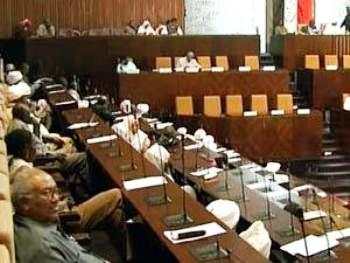Sudanese parliament backs decision to end UNAMID mandate
November 25, 2014 (KHARTOUM) – The speaker of the Sudanese parliament, al-Fatih Izz al-Din, has asked the foreign ministry not to back down from its decision to end the presence of the hybrid peacekeeping mission in Darfur (UNAMID) had it continued to violate its mandate.

UNAMID official spokesperson, Ashraf Eissa, confirmed in statements to Kuwait News Agency (KUNA) on Saturday the mission had “received a note verbal from the government of Sudan referring to the need for an exit strategy”.
Eissa added that consideration of an exit strategy is already contained in UN Security Council (UNSC) resolution 2173.
The move came in the wake of a crisis between the Sudanese government and UNAMID on investigating mass rape claims in a village in North Darfur state.
Social media has extensively circulated testimonies of victims from Tabit, a village 45km south-west of North Darfur capital El-Fasher, claiming that 200 women, including minors, were raped by soldiers from the Sudanese army (SAF).
On 9 November, a UNAMID verification team investigated the rape allegations in Tabit and said it found no evidence proving the rape claims.
However, recent media reports quoted UN officials as saying that the mission said in a secret report to the UN headquarters that witnesses were intimidated by the heavy presence of the Sudanese army during the investigation.
Sudan has refused to allow the mission access to Tabit to conduct another investigation despite repeated calls from the UN chief and the UNSC.
Izz al-Din said in the parliamentary session on Tuesday that the decision to expel UNAMID will remain in place unless the mission abides by its mandate.
The deputy speaker, Samia Ahmed Mohamed, for her part, called for reconsidering the work of the mission, saying that reports about mass rape in Tabit were nothing but “media lies”.
She accused the mission of failing to carry out its work, wondering where had they been when they failed to protect civilians and protect themselves.
“UNAMID should focus on playing its role instead of looking for media lies. We have to reconsider the work of this mission and it must seek to achieve peace instead of tearing up the social fabric,” she said.
In Washington, a number of Darfurian groups in the USA called on the UN chief Ban Ki-moon and the Security Council to take the necessary measure to provide the needed protection to the civilians in Darfur.
The groups said the Security Council, the secretariat, and UN Department of Peacekeeping Affairs (UN DPKO) must accept responsibility for the failure of UNAMID in Darfur.; “It is UN DPKO that must do most to explain what it will do in light of this failure,” the further said.
They further demanded that plans be made immediately for an UN force that can adequately take on the “responsibility to protect” civilians at risk, per the September 2005 UN World Summit Outcome Document (§38, §39).
“We demand that the Security Council and UN DPKO confront the Khartoum regime over its countless flagrant violations of the SOFA,” they stressed.
CRITICISM FOR RADIO STATION
Meanwhile, several MPs in the Sudanese parliament have harshly criticised the Netherlands-based Radio Dabanga, accusing it of involvement in reporting claims of mass rape in Tabit.
They also blamed government officials and MPs of dealing with Radio Dabanga, urging the concerned bodies to jam its broadcast.
MP, Abdel-Jabar Abdalla Hassab Alla, demanded the parliament to issue a clear warning against government official who deal with Radio Dabanga, saying the information ministry must bring the radio’s broadcast to an end.
While MP Hussein Jibril Abdalla strongly attacked Radio Dabanga, describing it as “traitor radio” which continued to promote rumours.
MP, Musa Madebo, for his part, said that Radio Dabanga has great influence on the people in Darfur, pointing he had warned against the danger posed by the radio but to no avail.
“I toured around the internally displaced persons (IDPs) camps and I noticed that the people are gathering to listen to Radio Dabanga,” he said.
(ST)
